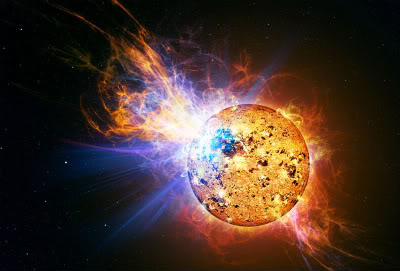Every 11 years, the sun's magnetic activity ramps up, sometimes to a frenzy, causing large sunspots and strong flares.
每隔11年,太阳磁场活动便会加强,有时更会变得狂暴形成巨大的太阳黑子及强烈的太阳风暴。
Right now we should be in the middle of such a solar maximum.
而此时此刻我们应该是出于太阳磁场活动最高峰的阶段。
But we've yet to see the expected level of activity.
但我们一直还没亲眼得见所期待的那些活动。
In fact, this latest solar max has been a bit of a dud.
事实上,这一次的太阳活动出现了点小问题。
“Compared to say the five or six previous cycles, this is really weak.”
“同5或6年前的活动周期相比,这次真的很弱。”

That's astronomer Sarbani Basu of Yale University, at the 224th meeting of the American Astronomical Society in Boston on June 3rd.
这是6月3日于波士顿举行的美国天文协会第224届会议上耶鲁大学天文学家萨巴尼巴斯的原话。
“And then when we went back and started comparing with whatever little data we had of the previous cycles, we realized it may not be that peculiar after all.”
“而当我们再次与之前相关太阳活动周期研究中的任何数据进行比对,我们意识到这次也许没什么特别的。”
We don't really know yet whether the current cycle is the oddball, or if previous cycles were unusually strong.
我们仍然还是不清楚当前发生的这次周期活动是否是真的奇怪,或者是以前的那些活动异常强烈。
Ground-based telescopes started closely monitoring solar activity only around 60 years ago.
地球上的天文望远镜密切监测太阳周期的活动只有60余年的历史。
And high-quality space-based observations go back just a decade—not even a full solar cycle.
而高质量的空间探测活动也才有十余年历史—甚至没有达到一个太阳活动周期的时间。
So astronomers are eagerly awaiting what the future can tell us.
所以天文学家们正热切期盼着未来的研究。
“It's going to be fun the next few years, I'm looking forward to it.”
“接下来的几年想来会非常有趣,我拭目以待。”












